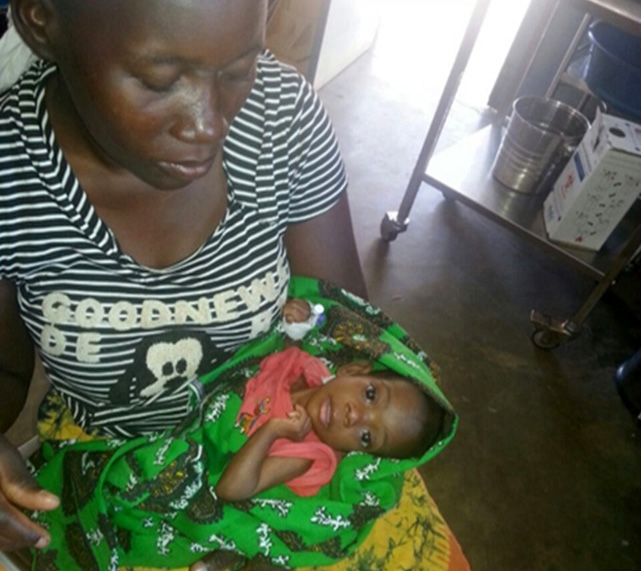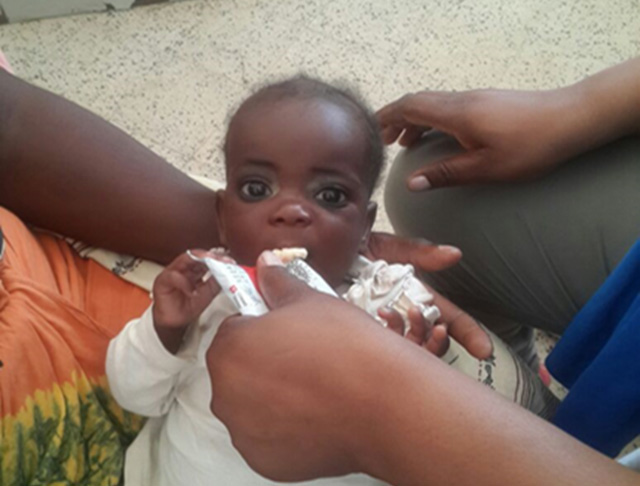The Government of Mozambique has made a priority of reducing malnutrition among children under 5. However, parents and caregivers often face barriers that prevent their malnourished children from getting the care they need. As part of its support to Mozambique’s National Nutrition Rehabilitation Program (Programa da Reabilitação Nutricional), FANTA has worked with the Ministry of Health and health facilities to help parents and caregivers become aware of the importance of receiving appropriate treatment and overcome these obstacles.
Many barriers to accessing care are related to logistics, economics, and social norms. For example, the distance to the nearest health facility can be an obstacle. The facility might be too far for parents or caregivers to walk to and from in one day, or they might not have the money or the means to travel to the facility. Some caregivers prefer to take their children to the local traditional healer first and then to the health facility if the child’s condition worsens. Another critical barrier is the opportunity cost parents and caregivers experience when they must leave other children at home or miss work—especially farm work—to take a sick child to a facility.
When faced with these challenges, some parents/caregivers might choose not to pursue care for their children. Health workers can help parents/caregivers understand the importance of receiving appropriate treatment and work with them to find solutions to the barriers that prevent them from accessing—and fully benefiting from—care for their children. Overcoming barriers “is important … to support nutritional rehabilitation,” said Garcia Sevene, the Nutrition Focal Point for Nampula Province.

Ms. Yacumbe and Jamila before treatment. (Photo by Ines Natercia P Roxa)
Counseling helped one mother from Angoche District in Nampula overcome a barrier that affected care for her infant daughter. In June 2016, Mariamo Yacumbe brought her 10-month-old daughter Jamila to Angoche Rural Hospital. Jamila was sick, weighed only 3.1 kilograms, and had no appetite. The hospital staff wanted to admit Jamila to inpatient care so she could receive specialized treatment for severe acute malnutrition. At first, Ms. Yacumbe was reluctant to stay at the hospital because she had three other children who needed her care at home. Hospital staff who were trained by FANTA advised Ms. Yacumbe and explained that Jamila needed to receive inpatient care or she might not survive. Ms. Yacumbe eventually allowed Jamila to be admitted.
After a few days, Ms. Yacumbe’s family pressured her to return home—and interrupt Jamila’s treatment—to care for the other children. Ms. Yacumbe and Jamila left the hospital but soon returned when Jamila became sicker. After learning about the obstacle Ms. Yacumbe faced, hospital staff trained by FANTA again counseled her, this time recommending that she bring Jamila to the at-risk child clinic once a week so Jamila could get the treatment she needed and Ms. Yacumbe would be away from her other children only one day a week. Ms. Yacumbe agreed. “Since my daughter started the treatment for malnutrition, I have been noticing that she is much better," Ms. Yacumbe said. After four visits to the at-risk clinic, Jamila recovered.

Jamila at an at-risk clinic visit. (Photo by Ines Natercia P Roxa)
Working with parents/caregivers to address obstacles to care is vital to efforts to improve nutrition and health. Overcoming barriers helps “ensure a good quality of life for patients,” noted Mr. Sevene.


